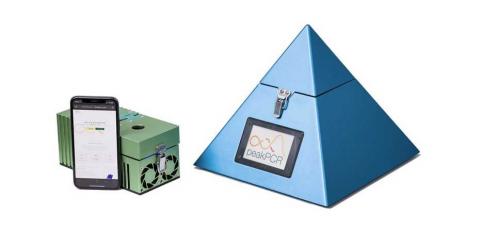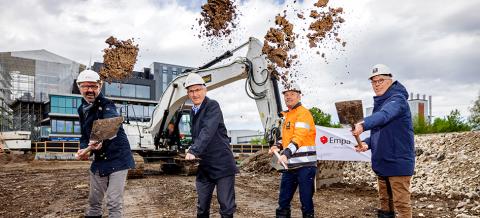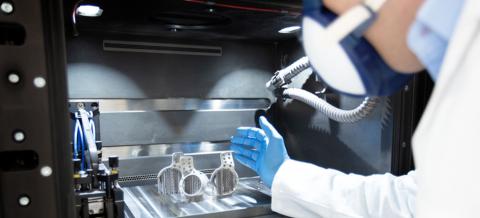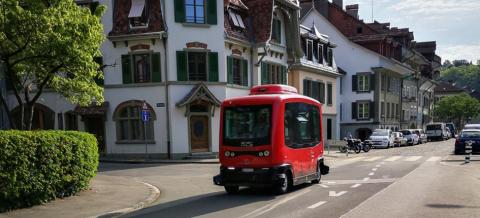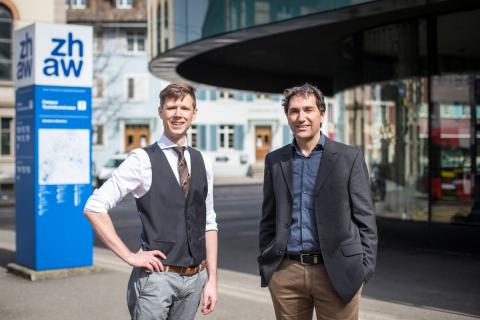The price of wood has skyrocketed during the coronavirus pandemic: wood is in short supply and building projects are being delayed. In contrast, in Dübendorf in the canton of Zurich, an innovative office unit – aptly named Sprint – will be completed faster than anticipated. Repurposed materials were predominantly used for this. For example, high-quality parquet from a derelict building is gaining a new lease of life. At the same time, this also includes new solutions: baubüro in situ from Zurich and Basel has come up with the idea of creating new dividing walls from old carpet tiles that are tested by researchers and optimized with regard to noise insulation.
Sprint was created on a floor of the NEST research and innovation building of the Swiss Federal Laboratories for Materials Science and Technology (Empa) and the Swiss Federal Institute of Aquatic Science and Technology in the ETH area (Eawag). After just seven months, the office unit is scheduled to be ready for occupancy in June. NEST Innovation Manager Enrico Marchesi says: “The project shows that quick, flexible, ambitious construction with repurposed elements works best – and does so under market conditions.”
Circular construction is the future
Environmental and climate issues make circular construction an important subject, but another driving force is the economic pursuit of material efficiency. Accordingly, Empa receives a lot of requests on this subject from construction companies and municipalities according to Marchesi. The material testing and research institute has become established in Switzerland as one of the most important innovation centers for this topic – not least after new standards were set in 2018 with the NEST unit entitled UMAR. UMAR stands for “Urban Mining and Recycling”: Virtually all materials used there can be repurposed. The Sprint project is building on these experiences, and it even goes a step further by bringing the approach to construction with partners such as the building technology company Bouygues E&S InTec Schweiz.
Construction industry needs more sustainable processes
Projects like this one enhance the understanding of more sustainable planning. There is a rich treasure trove of materials, with around 4,000 demolition projects per year in Switzerland. In recent years various platforms selling building components such as windows or even furniture saved from office buildings have arisen, such as Salza and ReWinner – both from Zurich. With the large number of high-quality buildings in Switzerland, people who hunt for elements that can be repurposed are often richly rewarded. However, searching takes time and experience. “Moreover, dismantling must be considered in the building process. For Sprint, screws are consequently used instead of nails, which allows clean separation,” notes Oliver Seidel, an architect at baubüro in situ, which is responsible for Sprint.
Ecosystem simplifies material flows
Empa is part of an entire ecosystem driving forward circular construction in the Greater Zurich Area. This also includes the City of Zurich itself, which is supporting the development of digital solutions in this field. The international materials platform Madaster is starting out in Switzerland from Zurich as well. It offers digital tools such as material passes and indices on the economic and circular value of buildings. Having already partnered with the Swiss Federal Institute of Technology ETH, in February Madaster found its first partners in the construction industry.
Last but not least, numerous start-ups are developing solutions for circular materials. For example, the ETH spin-off Oxara has achieved international recognition with its cement-free concrete made from clay-based excavation material. Empa Innovation Manager Enrico Marchesi is confident: “If we pull together, we will make it so that the constructed environment is increasingly considered as a valuable material store.”
By Yvonne von Hunnius
Related news
Meet with an expansion expert
Our services are free of charge and include:
- Introduction to key contacts in industry, academia, and government
- Advice on regulatory framework, taxes, labor, market, and setting up a company
- Custom-made fact-finding visits, including office and co-working space
